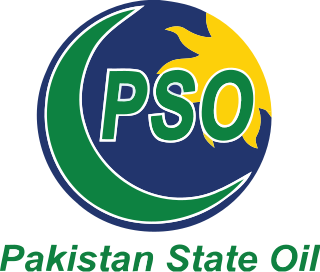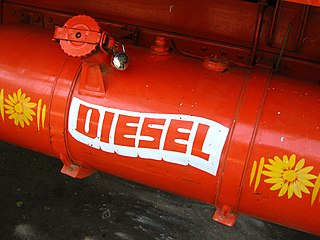Catalytic reforming is a chemical process used to convert petroleum refinery naphthas distilled from crude oil into high-octane liquid products called reformates, which are premium blending stocks for high-octane gasoline. The process converts low-octane linear hydrocarbons (paraffins) into branched alkanes (isoparaffins) and cyclic naphthenes, which are then partially dehydrogenated to produce high-octane aromatic hydrocarbons. The dehydrogenation also produces significant amounts of byproduct hydrogen gas, which is fed into other refinery processes such as hydrocracking. A side reaction is hydrogenolysis, which produces light hydrocarbons of lower value, such as methane, ethane, propane and butanes.

Singapore Petroleum Company Limited, in short SPC, is a subsidiary of Chinese state-owned company PetroChina. It is involved in the exploration and production of petroleum, refining, trading and petroleum product distribution.
Guwahati Refinery was set up at Noonmati in Guwahati on 1 January 1962. Guwahati Refinery is the first Public Sector refinery of India and belongs to Indian Oil Corporation Limited. The refinery was inaugurated by Late Pandit Jawahar Lal Nehru, the first Prime Minister of independent India. The refinery was built with Romanian Collaboration and has a capacity of 1.0 million metric tonnes per annum. This refinery process crude oil from Upper Assam Oil Fields, India and helps cater energy need of the region. Major Products of this refinery are
- LPG,
- Motor Spirit (Petrol),
- Aviation Turbine Fuel (ATF),
- Kerosene,
- High Speed Diesel,
- Light Diesel Oil and
- Raw Petroleum Coke.

Chennai Petroleum Corporation Limited (CPCL) a Group company of Indian Oil Corporation (IOCL) is an Indian state-owned oil and gas corporation headquartered in Chennai, India. It was formed as a joint venture in 1965 between the Government of India (GOI), AMOCO and National Iranian Oil Company (NIOC), having a shareholding in the ratio 74%: 13%: 13% respectively. From the grassroots stage CPCL Refinery was set up with an installed capacity of 2.5 million tonnes per annum (MMTPA) in a record time of 27 months at a cost of Rs. 430 million without any time or cost overrun.

The Nayara Energy Refinery is an oil refinery at Vadinar, Gujarat, India. It is owned and operated by the Rosneft.
Kochi Refinery (KR) is a crude oil refinery in the city of Kochi, Kerala, India. It is the largest public sector refinery in India with a production capacity of 15.5 million tons per annum (MMTPA). Formerly known as Cochin Refineries Limited and later renamed as Kochi Refineries Limited, it was acquired by Bharat Petroleum Corporation Limited in the year 2006. The refinery is situated at Ambalamugal, around 12 km east of the city centre.

Pakistan State Oil is a Karachi-based Pakistani state-owned multinational petroleum corporation involved in marketing and distribution of petroleum products. It has a network of 3,689 petroleum filling stations, out of which 3500 outlets serve the public retail sector and 189 outlets serve wholesale bulk customers. Pakistan State Oil is Pakistan's largest fuel marketing company.

The Attock Refinery Limited is a Pakistani petroleum company which is a subsidiary of UK-domiciled Attock Oil Company. It is active in crude oil refining in the country. The company is based in Rawalpindi, Punjab, Pakistan.

Shell Pakistan Limited is a Pakistani oil and gas company which is a subsidiary of the Royal Dutch Shell, PLC and has been in South Asia for over 100 years. Shell’s flagship business in Pakistan is the downstream retail marketing company, Shell Pakistan Limited, which has interests in downstream businesses including retail, lubricants and aviation
INA-Industrija nafte, d.d. is a Croatian multinational oil company. INA Group has leading role in Croatia's oil business, a strong regional position in the oil and gas exploration and production, oil processing, and oil product distribution activities. INA, d.d. is a stock company with the Hungarian MOL Group and the Croatian Government as its biggest shareholders, while a minority of shares is owned by private and institutional investors. INA shares have been listed at the London and Zagreb stock exchanges since December 1, 2006. INA Group is composed of several affiliated companies wholly or partially owned by INA, d.d.. The Group has its headquarters in Zagreb.

The Ra's Lanuf Refinery is a topping and reforming oil refinery in Ra's Lanuf, Libya. It is part of a larger petrochemical complex also consisting of an ethylene plant, a polyethylene plant, plant utilities, and Ra's Lanuf Harbor. Until 9 March 2009, the complex was operated by the RASCO, a subsidiary of the National Oil Corporation. The current operator is the Libyan Emirates Oil Refining Company.
Ras Lanuf Oil and Gas Processing Company (Rasco) is a subsidiary of the state-owned National Oil Corporation of Libya. Rasco operates the Ras Lanuf Refinery.
The Zawia Oil Refining Company (ARC) is a subsidiary of the National Oil Corporation (NOC), incorporated under Libyan Commercial Law since 1976. ARC operates the Zawia Refinery, which was built in 1974 by Snamprogetti, Italy. Zawia is currently the country's second largest oil refinery after the Ra's Lanuf Refinery. Primary products include naphtha, gasoline, kerosene, light vacuum gas oil (VGO), fuel oil, base lubricating oils, and asphalt.
The Aspropyrgos Refinery is an oil refining complex located near Aspropyrgos, a suburb of Athens, in Greece. It is operated by Hellenic Petroleum. The refinery has a nominal annual refining capacity of 7.5 million tons.

Pak-Arab Refinery (PARCO) is a Pakistani joint venture oil and gas company active in refining, transporting and marketing petroleum products. It is a joint-venture between governments of Pakistan and Abu Dhabi.

National Refinery Limited is a Pakistani oil refinery which is a subsidiary of UK-domiciled Attock Oil Company. It is based in Karachi, Pakistan.
The Bharat Oman Refineries Limited (BORL) is the company that owns and operates Bina Refinery, located at Bina in the Sagar district of the state of Madhya Pradesh in India. Built as a joint venture between India's Bharat Petroleum Corporation (BPCL) and Oman's Oman Oil Company, the 6 MTPA refinery was commissioned in May 2011. The capacity of the refinery was further enhanced to 7.8 MMTPA in 2018.
Byco Oil Pakistan Limited is a Pakistani petroleum company which is a subsidiary of Mauritius-incorporated company Byco Industries Incorporated. It is based in Karachi, Pakistan.

Indian Oil Corporation Limited (IOCL), commonly known as IndianOil is an Indian state government owned oil and gas company headquartered in New Delhi. It is the largest commercial oil company in the country, with a net profit of INR 19,106 crore for the financial year 2016–17. It is ranked 1st in Fortune India 500 list for year 2016 and 117th in Fortune Global 500 list of world's largest companies in the year 2019. As of 31 March 2017 IndianOil's employee strength is 33,135, out of which 16,545 are in the officer cadre. It is India's largest downstream oil company, with a work force of more than 33,000 employees, a turnover of Rs. 506,428 crore and a net profit of Rs. 21,346 crore in 2017-18.

The Sapugaskanda Refinery is the single largest oil refinery of Sri Lanka. The refinery was built by Iran under the guidance of the Ceylon Petroleum Corporation in August 1969, initially designed to process 38,000 BPSD of Iranian Upper Zakum crude oil, and Arabian light crude oil. It was commissioned on 12 October 1969. The facility, which covers an area of 165 acres (67 ha), currently has a capacity of 50,000 BPSD .
















